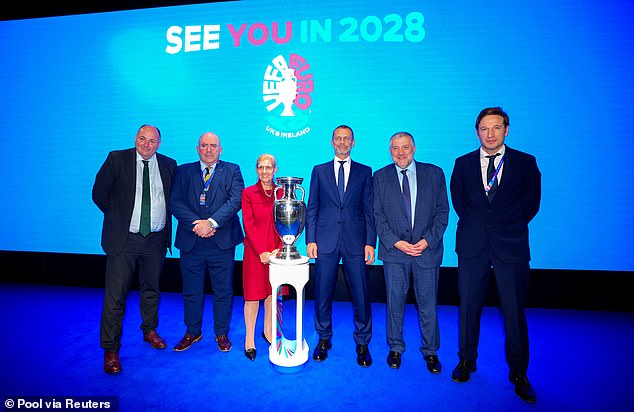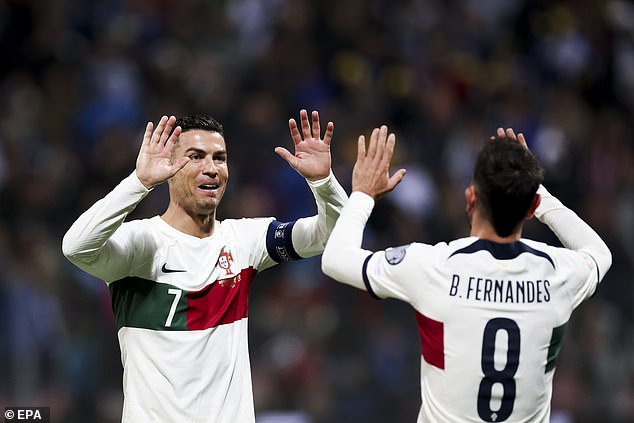The SFA is helping to examine proposed changes to the way European nations qualify for future tournaments.
UEFA has become concerned that many fans and broadcasters throughout Europe are increasingly being turned off by the current format where between four and six international teams compete in 10/12 groups.
With the European Championships and World Cup expanding, there’s a sense that there’s not enough jeopardy for the major nations.
In October, UEFA president Aleksander Ceferin confirmed that discussions were underway to see if a new format could be found which would bring a freshness to qualifying.
‘There won’t be any more matches, but a more interesting format,’ he said.
This was taken to mean that a mono-group system — like the one UEFA has adopted for the Champions League — was under consideration.

UEFA president Aleksander Ceferin has indicated changes are afoot to qualifying in future

Scotland emerged from a tough section to qualify for Euro 2024, beating Spain in the process

Discussions about potential changes were expanded on at the Euro 2028 launch in London
The shift away from the old four-team section from last season has been broadly welcomed, with most fans favouring the new format where each team faces eight different opponents.
While a move to the so-called ‘Swiss system model’ for international football now seems the preferred option, an alternative could be that the popular Nations League holds greater sway in deciding who qualifies.
Daily Mail Sport understands that the SFA are now part of the working group which is examining alternative formats. It’s believed that Scotland’s governing body is open to any innovation which is likely to excite fans.
Although Scotland’s hopes of reaching next summer’s World Cup hinges on the final two games with Greece and Denmark, it’s felt that interest in the campaigns of many of the stronger nations is now flagging and that this will eventually affect TV deals.
England reached the 48-team 2026 World Cup with two games to spare after they won an uninspiring group including Serbia, Albania, Latvia and Andorra.
Portugal qualified for Euro 2024 by winning all 10 of their matches, with France only drawing one of theirs.

England have qualified for next year’s World Cup with two games to spare in a lifeless section
Any change is unlikely to come in time for Euro 2028 — a 24-nation event which will be jointly hosted by Scotland, England, Wales and the Republic of Ireland — meaning any new format would come in for the qualification for World Cup 2030, to be predominantly held in Morocco, Portugal and Spain.
Fifty-four European countries started out in the 2026 qualifiers, with 16 eventually making it through to the finals in USA, Canada and Mexico.
Speaking at a Euro 2028 launch event in London, the FA’s chief executive, Mark Bullingham, claimed it was time to change the way European nations qualified.
‘I think it’s really important to overhaul it,’ he said. ‘I think we need to keep looking at ways to make international football even better and there’s genuine appetite to do that. UEFA are clearly leading that, but I’m one of a group of countries that’s helping them to look at options.’
The FA chair, Debbie Hewitt, echoed Bullingham’s stance. ‘Football changes, the world changes, the number of tournaments changes, the number of teams playing in those tournaments changes,’ she said.
‘So, if we stick with the same model of qualification, it’s probably going to get bent out of shape. I think we have to keep looking at challenging.’

Portugal won all ten of their qualifying fixtures en route to reaching Euro 2024
It was revealed this week that Hampden will stage six matches in Euro 2028 including a quarter-final. Scotland would play all their games at the Glasgow venue if they qualify.
Bullingham, meanwhile, confirmed that dynamic ticket pricing, which had been controversially adopted by FIFA for next year’s World Cup, will not be used.
‘There won’t be any dynamic ticket pricing,’ he said. ‘I think that’s really well established. (There are a) couple of basic principles.
‘One is no dynamic ticket pricing, and the other one is that approximately half of the tickets will be in category three, and also the fan first category, which is the category below that. So, we’re really confident there will be a lot of accessible ticket prices.’
